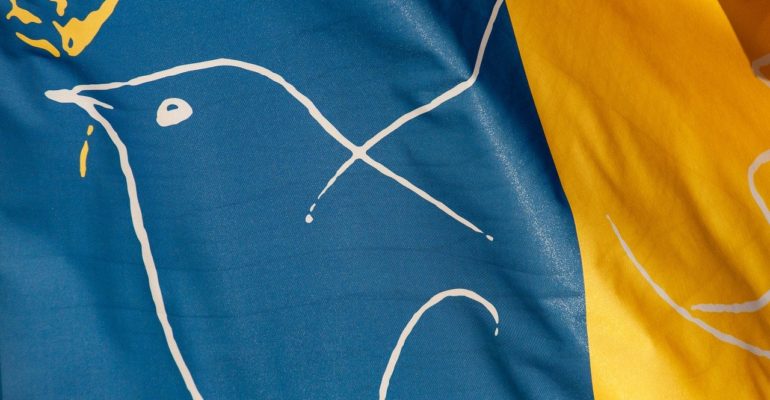“Fear Not” Says History: Give Ukraine More Direct Support
March 14, 2022 2024-06-15 12:47“Fear Not” Says History: Give Ukraine More Direct Support


Peter D. Johnston is an international negotiation expert and pioneer in asymmetric negotiation. He is the award-winning author of Negotiating with Giants, and Weapons of Peace, in which he explores Hitler’s mindset and attempts to develop a nuclear weapon. He advises corporations, governments, and NGOs on their most challenging negotiations.
Date Posted: March 14, 2022
As a smaller nation up against a Russian Goliath, Ukraine and its leader Volodymyr Zelensky have fought and negotiated in a manner worthy of history’s best negotiators, including Nelson Mandela overcoming apartheid, Ben Franklin helping turn the War of Independence, and the barons compelling King John to sign Magna Carta in 1215. But in his asymmetric negotiation with Putin, Zelensky has yet to succeed in arguably his most urgent quest: convincing another giant, in the form of NATO and the United States specifically, to become more directly involved.
To date, NATO nations and others have acted swiftly and brilliantly to weaken Russia internally through sanctions while indirectly bolstering Ukraine’s defenses. The ideal outcome would likely be for Russians to oust Putin, allowing Russia to most quickly shed its pariah status. This may still occur, but with relatively tiny Ukraine suffering on the frontlines, NATO must now fully join forces with Zelensky to end Putin’s growing war crimes and dominance before it’s too late.
Best negotiation practices from conflicts across time confirm this need for support while highlighting how NATO can use its strength to level the playing field for Ukraine. The crucial lesson: to get the better of a hulking counterpart, smaller players such as Ukraine “change the game,” bolstering their odds by adopting uniquely different mindsets and approaches. So far, NATO continues to play Putin’s game, in part by ignoring Zelensky’s pleas for overt support.
When President Biden declares with conviction that direct US involvement will lead to World War III, he risks following a script that Putin could have written for him, raising worst fears of global conflagration destined to keep NATO on the sidelines. The fact is that Putin is already at war with Western nations—with Ukraine as a proxy. Putin himself cited sanctions as “akin to a declaration of war,” while no doubt appreciating that NATO continues to pretend otherwise, respecting imaginary lines, not demolishing his forces—even as he demolishes Ukraine.
The other worst fear holding back NATO relates to the potential use of nuclear arms by Russia. Herein lies a long-standing negotiation lesson: tread carefully in assuming your worst fear equals their intention. Otherwise, such a mindset can lead to either paralysis, or acting prematurely. The US and former Soviet Union ultimately got this right during the Cuban Missile Crisis. Fueling worst-fear thinking now is talk of Putin being mentally unstable or evil, which is readily inferred to mean that he might be the first outlier in 77 years to launch nuclear weapons. But if Putin is acting rationally, which appears most likely based on his personality type, interests, and escalating pattern of aggression over the past two decades, this is exactly how he wants you to view his threats and the likelihood he will follow through.
Putin’s nuclear threat makes some strategic sense, but it’s not obvious why he would actually employ short-range or long-range nuclear weapons given the inevitable counterattacks. This is a father of many children and grandchildren, a doting one by some accounts. This is also someone who has been proudly dedicated to Russia’s history. Would he put his country and fellow Russians at risk of complete annihilation? Only if you assume he’s unstable and doesn’t truly care about his nation, legacy, life, or family. No leader of a nuclear-weapon state, even North Korea’s, has initiated mutually assured destruction, speaking to the power of this principle and how unlikely it is that Putin would be the first exception. This said, any probability Putin might be an outlier can be further reduced by another best practice: being clear about the game. Such a practice would involve transparently telling Putin and his people what NATO’s first targets would be if he were to launch a strategic or tactical nuclear weapon. Changing perceived choices this way forces Putin to run a concrete cost-benefit analysis; it also creates specific pending losers in Russia who could pre-empt that loss through the removal of their president.
There remains, of course, some lower probability that Putin could initiate a nuclear exchange due to NATO’s direct involvement. This is a terrifying consideration. However, the counter considerations are three-fold. First, if we don’t take a calculated risk now, with the odds of success high, under what circumstances exactly will we ever stand up against those who make such threats? Second, contrasted with a lower nuclear risk, there is a 100% probability that if NATO doesn’t act on Zelensky’s request, more atrocities will occur, thousands more will die, millions more will be displaced, Putin will want more land, and trillions of dollars more will be redirected into military budgets to contain Russia’s ongoing aggression. These trillions and fears of Putin’s next move will further challenge our survival because resources will be diverted from existential threats that we should be focused on, such as deadly viruses, food insecurity, and climate change. Third, what is the intrinsic value of humanity, and what we learned from World War II, if we don’t put ourselves at some risk, as those in Ukraine are doing, for a cause greater than our own immediate safety? This point is made more salient given that the US, United Kingdom, and Russia all committed to protecting Ukraine after it voluntarily gave up its nuclear arms in 1994 as part of a broader effort to disarm globally for the good of humanity.
Here is how, I believe, history’s successful underdogs would guide NATO in support of Ukraine as a smaller nation. Ben Franklin first reminding us, “And there is truth in the old saying that if you make yourself a sheep, the wolves will eat you.” Franklin would then encourage bringing a major power onside as he did with France in defeating the British, in this case, approaching the Chinese as the Biden Administration has done, even if it’s just economic and military neutrality, but ideally acting opportunistically to improve relations with China at Russia’s expense.
The English barons would remove a vital asset from Russia’s arsenal, as they did in taking the City of London from King John, in this context perhaps taking the skies from Russia as implored by Zelensky, until Ukraine is freed. As with sanctions, such efforts need to be incremental, initiating a limited no-fly zone for humanitarian purposes, for example, while expanding to include a broader no-fly zone if Russia doesn’t meet a series of commitments and deadlines for avoiding further war crimes, and de-escalating the conflict, then ending it. In doing so, Mandela would urge the targeting of equipment and infrastructure whenever possible, not soldiers or civilians, making clear such interventions are defensive only, while promoting a “trojan-horse coalition,” as the ANC did with White South Africans, this time with Russia’s other leaders and its people by focusing on Putin alone as the enemy. He’d identify creative channels, including social media, to communicate to Russians that they can thrive once Putin is gone, with younger Russian progressives, and mothers losing soldier sons, among receptive targets.
War is negotiation. It occurs when one or more parties feel they can better influence others through fighting rather than talking, reaching agreement implicitly or explicitly afterwards. Smaller players are generally better not talking, or making concessions, until they have righted any extreme power imbalances, which NATO alone can do here on Ukraine’s behalf. It is possible that NATO knows secrets we don’t and is being guided accordingly. But one way or another, in helping Zelensky try to overcome the odds stacked against his smaller nation, NATO should embrace history’s lessons and fear not. President Biden and NATO’s leadership should also recognize that, as with Mandela, Ukraine’s likeable, courageous, and coalition-building leader is likely well ahead of the rest of us in knowing exactly what needs to be done and when, with the world, not just Ukraine, being the beneficiary of his strength and wisdom—if we listen.
Sources
Ben Franklin said,
“And there is truth in the old saying that if you make yourself a sheep, the wolves will eat you.”
W. Brands,
The First American: The Life and Times of Ben Franklin. 1st Anchor Books ed. (New York: Anchor Books, 2002), 463

